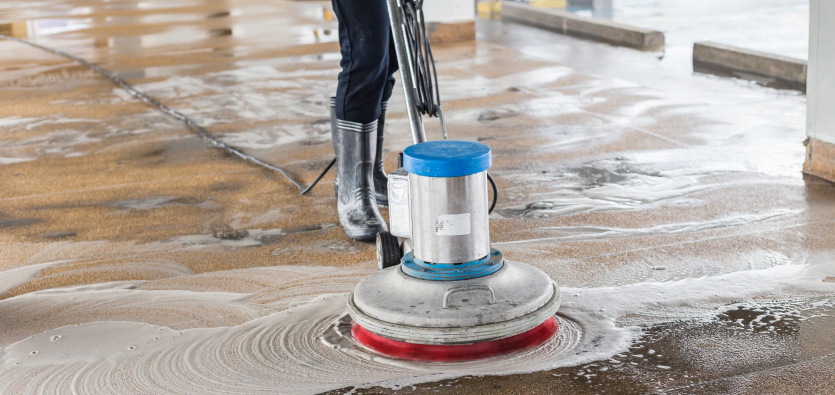
Concrete shop floors take a beating. Heavy foot traffic, constant equipment use, oil spills, and dirt buildup can turn even the best-installed concrete surfaces into safety hazards and eyesores. But here’s the catch: using the wrong cleaning products can do more harm than good.
The right cleaning process involves more than just scrubbing with soap and water. Industrial environments need targeted solutions that remove grease, grime, and residue all without damaging the concrete or eating away at protective coatings.
In this blog, we’ll break down how to clean concrete floors the right way using industrial cleaners, and what to avoid if you want those floors to last.
Let’s get into it.
Why Concrete Floors In Shops Need Special Attention
Concrete is tough, but it’s not invincible. Unlike tile or epoxy-coated floors, concrete is porous. That means it absorbs liquids, oil, chemicals, and water more easily. If you don’t clean it properly, grime seeps into the surface, causing stains and structural damage.
Over time, untreated stains can lead to erosion, weakening the surface and increasing slip hazards. That’s why using high-quality industrial cleaning products is essential.
Shops and warehouses in cities like Edmonton also deal with cold winters, which bring salt and moisture indoors. These elements can penetrate untreated concrete and cause freeze-thaw damage, leading to cracks or surface pitting. Sound familiar?
How Industrial Cleaners Make A Difference
Let’s face it: not all cleaning products are made for concrete. Many general-purpose cleaners are either too weak to remove grime or too harsh, stripping the floor of its natural resilience. This is where industrial cleaners come into play.
What Makes Them Different?
Industrial floor cleaners are specifically formulated for heavy-duty applications. They break down grease and oil without harming the floor’s surface. These products often come in pH-neutral or slightly alkaline formulations that clean without corroding.
You might be wondering: does that mean you need a different product for every type of spill? Not exactly. There are multi-purpose industrial cleaners available that work on oils, carbon buildup, and everyday shop dirt, provided you use them correctly.
Look for industrial cleaners labelled safe for concrete. Products with degreasing agents are particularly helpful in automotive shops or factories dealing with machinery fluids.
How To Clean Concrete Shop Floors Without Causing Damage
Before grabbing a mop or floor scrubber, let’s walk through the right process. Keeping your shop floors clean is about more than just what you use; it’s how you use it.
Step 1: Dry Sweep Daily
Dust, bolts, and debris gather fast in shop environments. A simple dry sweep helps prevent abrasive dirt from scratching the surface or getting stuck in cracks. Use a heavy-duty push broom with firm bristles for best results.
Step 2: Spot Treat With Degreasers
Oil leaks? Greasy footprints? Use an industrial degreaser for spot treatment. Apply the product directly, let it sit for a few minutes, then agitate with a brush. Rinse thoroughly to prevent residue from dulling the surface.
Avoid using bleach or ammonia, as both can cause concrete to break down over time. They’re also harmful if mixed with other chemicals, which is common in busy shop environments.
Step 3: Scrub Weekly With Industrial Floor Cleaners
Even with daily maintenance, deep cleaning is essential. A commercial floor scrubber with rotating brushes does the heavy lifting. Fill the tank with a diluted industrial floor cleaner and follow the machine’s instructions for pressure settings.
Choose your cleaner based on soil type:
- Light dirt: pH-neutral cleaner
- Heavy grease: alkaline degreaser
- Calcium/salt buildup: acid cleaner (used with extreme caution)
Using the wrong type of chemical can etch or discolour concrete, especially if it has a polished or sealed surface. Never skip the rinse; leftover chemical residue can make floors slippery and attract more dirt.
What To Avoid When Cleaning Concrete Shop Floors
It’s easy to make mistakes that cause long-term damage. Here are some things to steer clear of:
- Overusing acid cleaners: They work fast but erode concrete over time.
- Scrubbing too aggressively: This can scratch and wear down the surface.
- Using residential cleaners: Most lack the strength or compatibility needed for industrial use.
- Ignoring ventilation: Solvent-based cleaners like mineral spirits require proper airflow.
- Skipping dilution ratios: Concentrated chemicals can stain or soften concrete if not diluted properly.
Health Canada provides detailed safety information on handling cleaning chemicals in the workplace.
How To Choose A Reliable Supplier For Industrial Cleaning Products
If you’re buying from a big-box store or non-specialized supplier, you’re probably not getting what your floors need. Industrial facilities require consistent access to professional-grade cleaners that are compatible with heavy-duty flooring.
Here’s what to look for:
- Expert support: Ask about product suitability for sealed, stained, or untreated concrete.
- Variety: Your supplier should stock multiple types of industrial cleaners: degreasers, floor soaps, and pH-balanced solutions.
- Delivery options: Fast turnaround is key when spills happen or product runs low.
- Custom blends: Certain jobs require a tailored solution tailored to facility-specific cleaning needs.
The right supplier doesn’t just sell you a product; they help you use it properly and safely.
About Us
Sunrise Industrial Cleaners manufactures and supplies a complete range of industrial cleaning products, including degreasers, floor soaps, car wash solutions, and chemical applicators. Based in Edmonton, we serve businesses across Western Canada with fast delivery and exceptional product support. Need help selecting the right cleaner for your shop floor? Contact us today to speak with our team.
